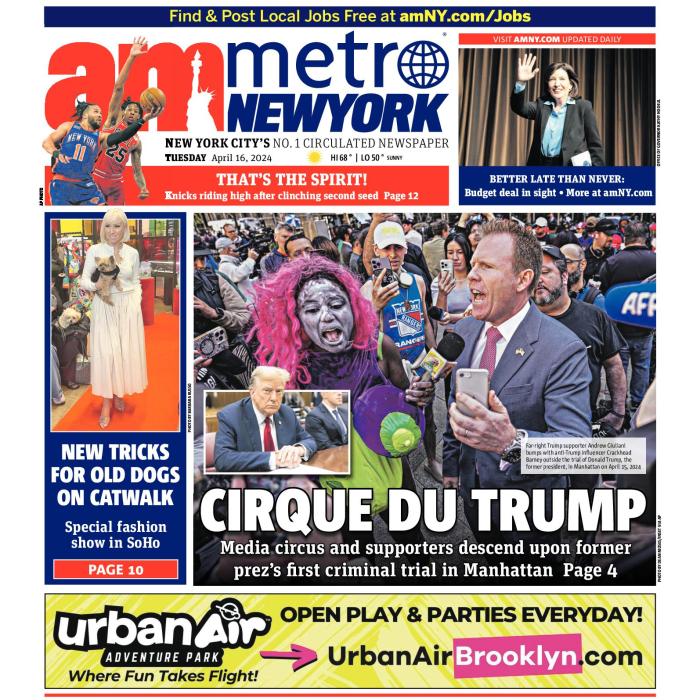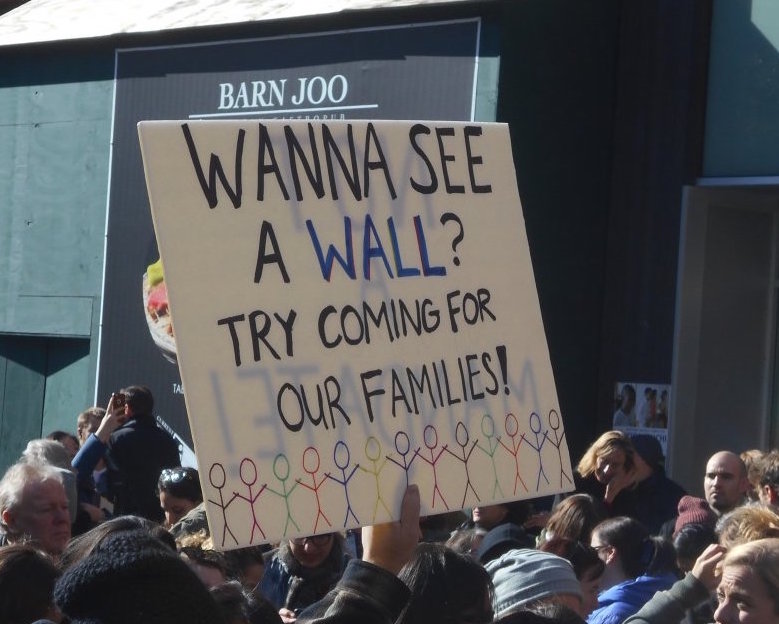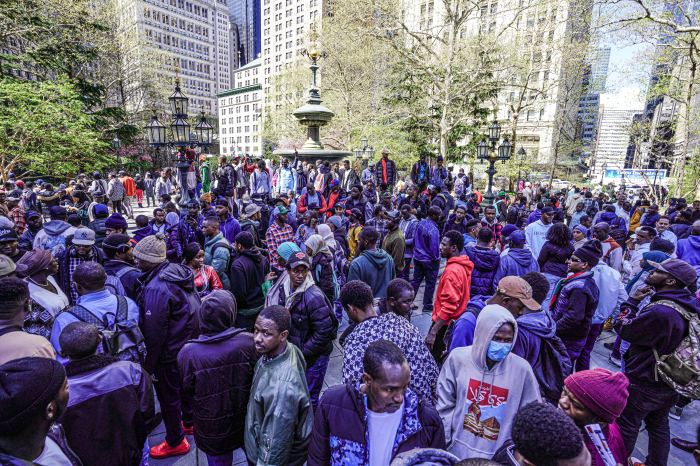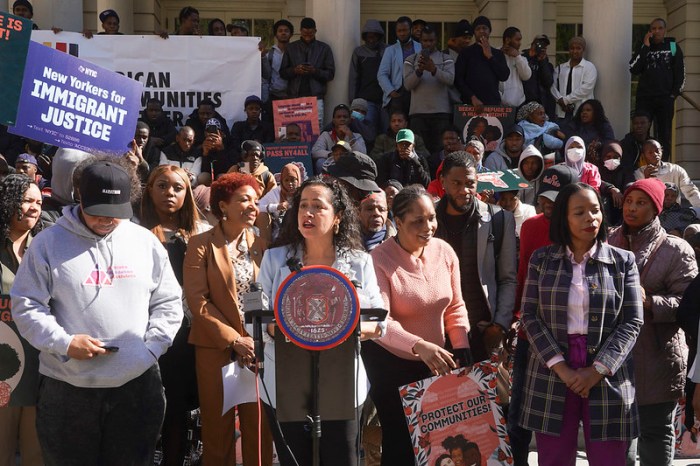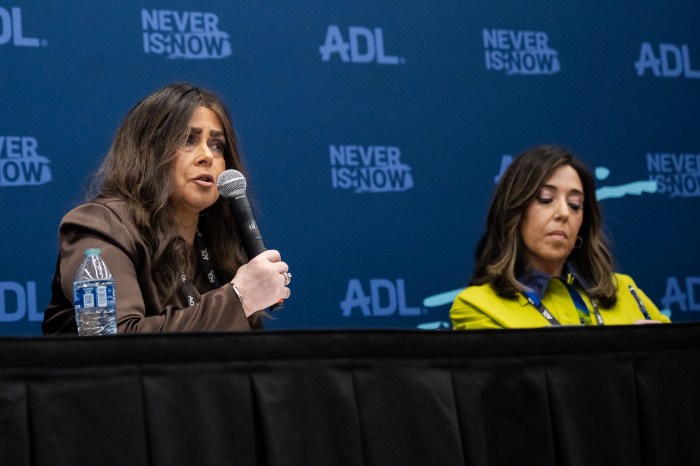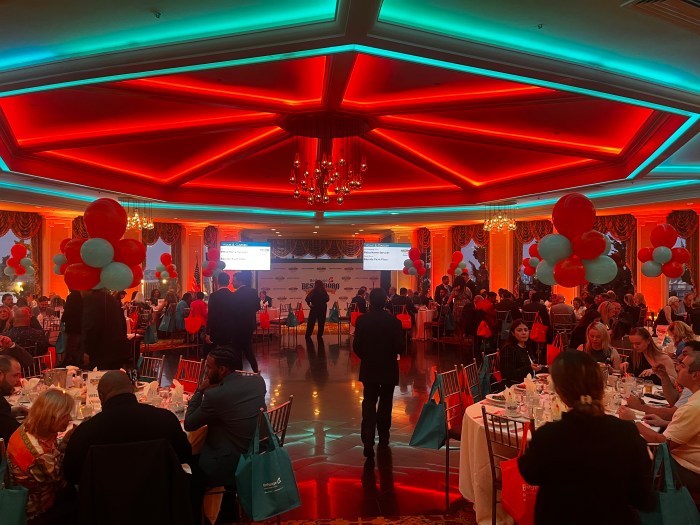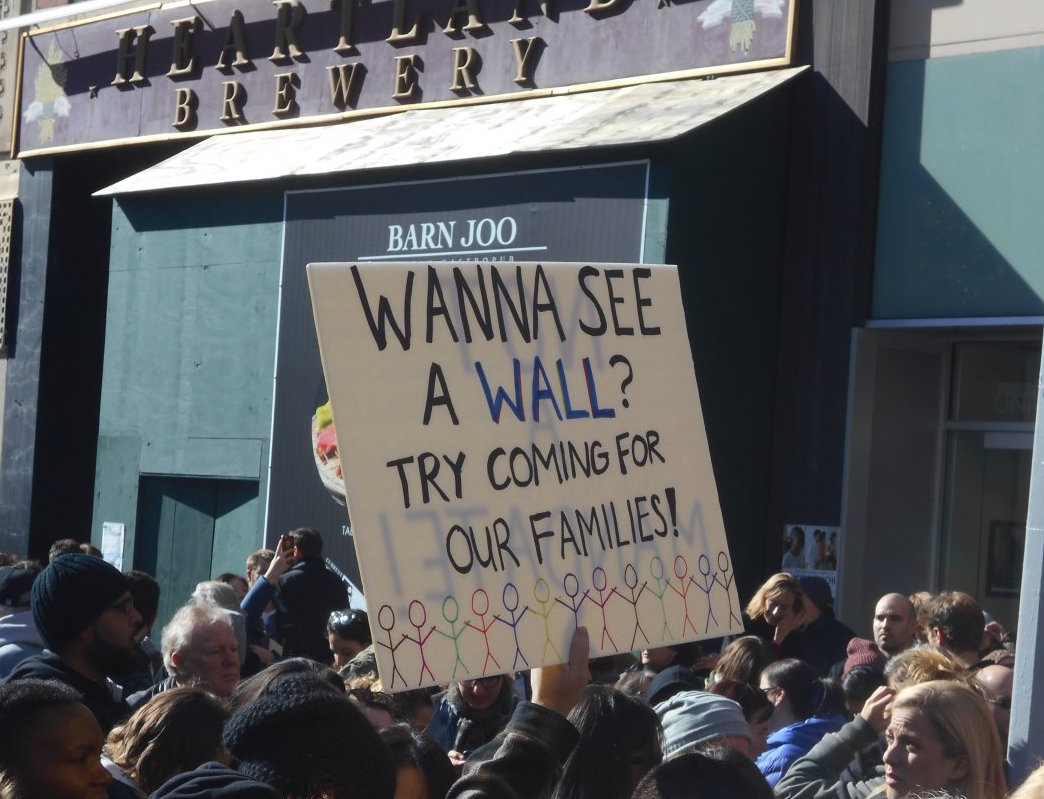
BY MARY REINHOLZ | Donald Trump softened his incendiary rhetoric against undocumented immigrants during a “60 Minutes” interview on Nov. 13, saying he would focus the government’s deportation apparatus on immediately removing about 2 to 3 million undocumented immigrants who have criminal records — “gang members, drug dealers” — once he takes office Jan. 20.
The figure he put forth is huge, but it’s considerably smaller than the 11 million immigrants Trump claimed he would remove from the U.S. while on the campaign trail. But his words have stirred fear and loathing in immigrant communities, even though critics say Trump’s numbers are way out of whack. They describe his proposal as an authoritarian pipe dream, unworkable in a democracy. They note it’s unlikely he will snap his fingers and get agents from U.S. Immigration and Customs Enforcement, or ICE, to round up suspects in their homes or workplaces, especially in a sanctuary city like New York that prohibits local police from sharing information and acting as an arm of the federal government.
“Trump says a lot of things that don’t make sense,” said Anne Pilsbury, a public-interest lawyer who directs Central American Legal Assistance, a nonprofit law service operating out of the basement of Transfiguration Roman Catholic Church on Williamsburg’s south side. She has a caseload of thousands of undocumented Latino immigrants, many of them seeking asylum after having fled violent gangs in South America.
“Every immigrant who he wishes to deport is entitled to his or her day in court,” Pilsbury stressed.
But the attorney also believes that Trump, who has called for defunding of sanctuary cities, will make life harder than it already is for undocumented immigrants living in the shadows here.
“Things are going to get very bad for them because we will have someone in the White House who is very hostile to immigrants — he could do tremendous damage” with executive orders, she said. For example, Trump has vowed to end President Obama’s 2012 initiative Deferred Action for Childhood Arrivals, or DACA; that executive order allows young people who came to the U.S. before age 16 and have been living continuously in this country for five years to apply for work permits, Social Security cards and other benefits, including three years of temporary relief from deportation.
Pilsbury also explained that while New York is “immigrant-friendly, benefits and resources for immigrants and whether they will continue are in the hands of Congress. And both houses are now under the control of Republicans,” she said.
Rosie Mendez, the veteran New York City councilmember, whose district covers the East Village and part of the Lower East Side, acknowledged that Trump’s surprise election victory over Democrat Hillary Clinton — who won the popular vote — has left many of her constituents “numb and in fear.” She noted reports show an uptick in hate crimes nationwide after the Nov. 8 election.
“So many of us are filled with anxiety, given that the winner of the Electoral College ran a campaign of intimidation which was xenophobic, sexist and racist,” she told The Villager. “Hate crimes were a problem in this country before Trump was elected. Therefore, the fear of an increase in bias-related crime and harassment is very real since the message that Trump ran on reinforces bigotry and bullying as the new normal.”
Mendez, who chairs the City Council’s L.G.B.T. Caucus and is a member of its Black, Latino and Asian Caucus, pledged to continue to “enforce our laws and work on protecting those individuals that are being targeted.”
On Wed., Nov. 16, Mayor Bill de Blasio, a staunch left-wing progressive who has clashed with Trump in the past, sat down with the bloviating businessman for a reported one-hour conversation at the president-elect’s 26th-floor office at Trump Tower on Fifth Ave. to express his concerns about the anxiety gripping New York’s immigrants and others. De Blasio gave few details but said the talk was respectful, substantive and “very candid.”
“The ball’s in his court,” he added.
Earlier, during a press conference at City Hall on Nov. 11, the mayor made it known that the city would resist any draconian effort at mass deportation of immigrants by the Trump administration.
“We are not going to sacrifice a half-million people who live amongst us, who are part of our communities, whose family members and loved ones happen to be people, in many cases, who are either permanent residents or citizens,” the mayor said. “We’re not going to tear families apart. So we will do everything we can to resist that.”
At The Cooper Union on Mon., Nov. 21, in a stemwinder that was alternately pensive, defiant and pragmatic, de Blasio said the city would not allow Trump to create a register for Muslims, deport undocumented immigrants, or attempt to subject African-Americans to a resumption of stop-and-frisk by the New York Police Department once Trump takes office Jan. 20. He also pledged to protect women and the L.G.B.T. community.
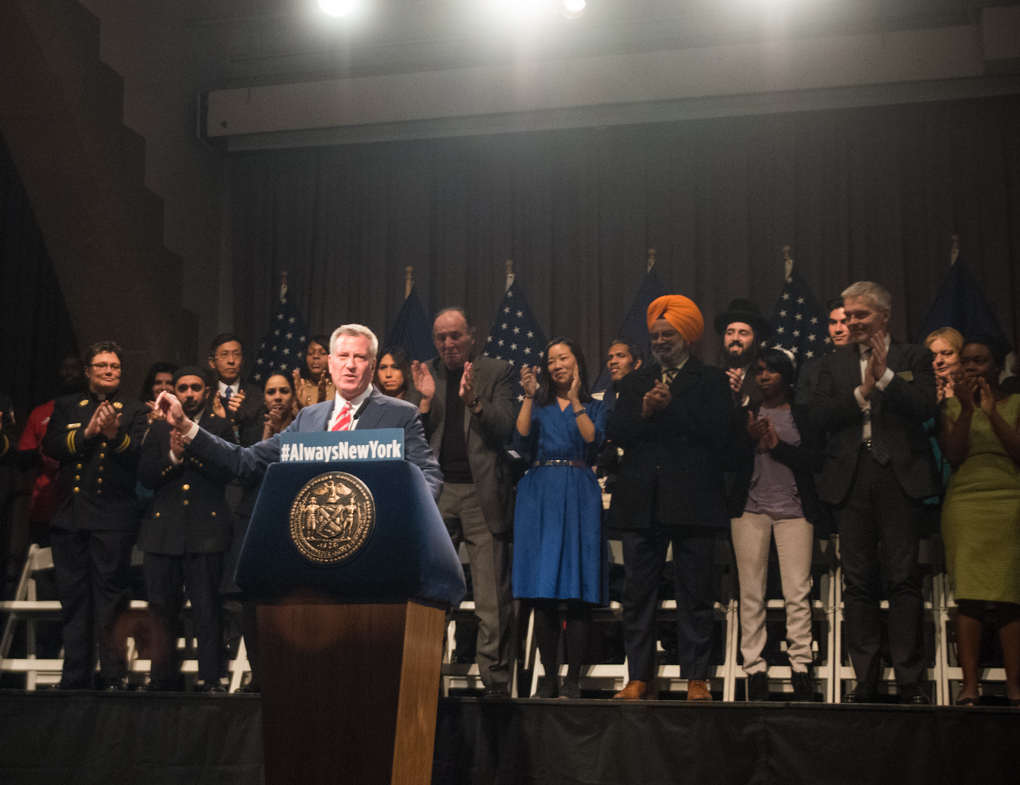
“Hillary Clinton won 1.5 million popular votes, so he doesn’t have a mandate,” de Blasio told the overflow crowd in the Great Hall.
Rosemary Boeglin, a mayoral spokesperson, said the city has a number of laws in place to ensure that immigrant residents’ rights are protected and that federal requests for detention and transfer of custody of an immigrant are “carried out constitutionally.”
She noted that two laws signed in 2014 by de Blasio require that the city only honor federal detainer requests for individuals in city custody if the person has been convicted of a violent or serious crime or is identified as a possible match in the terrorist screening database.
In addition, the requesting agency must provide a judicial warrant showing evidence of probable cause.
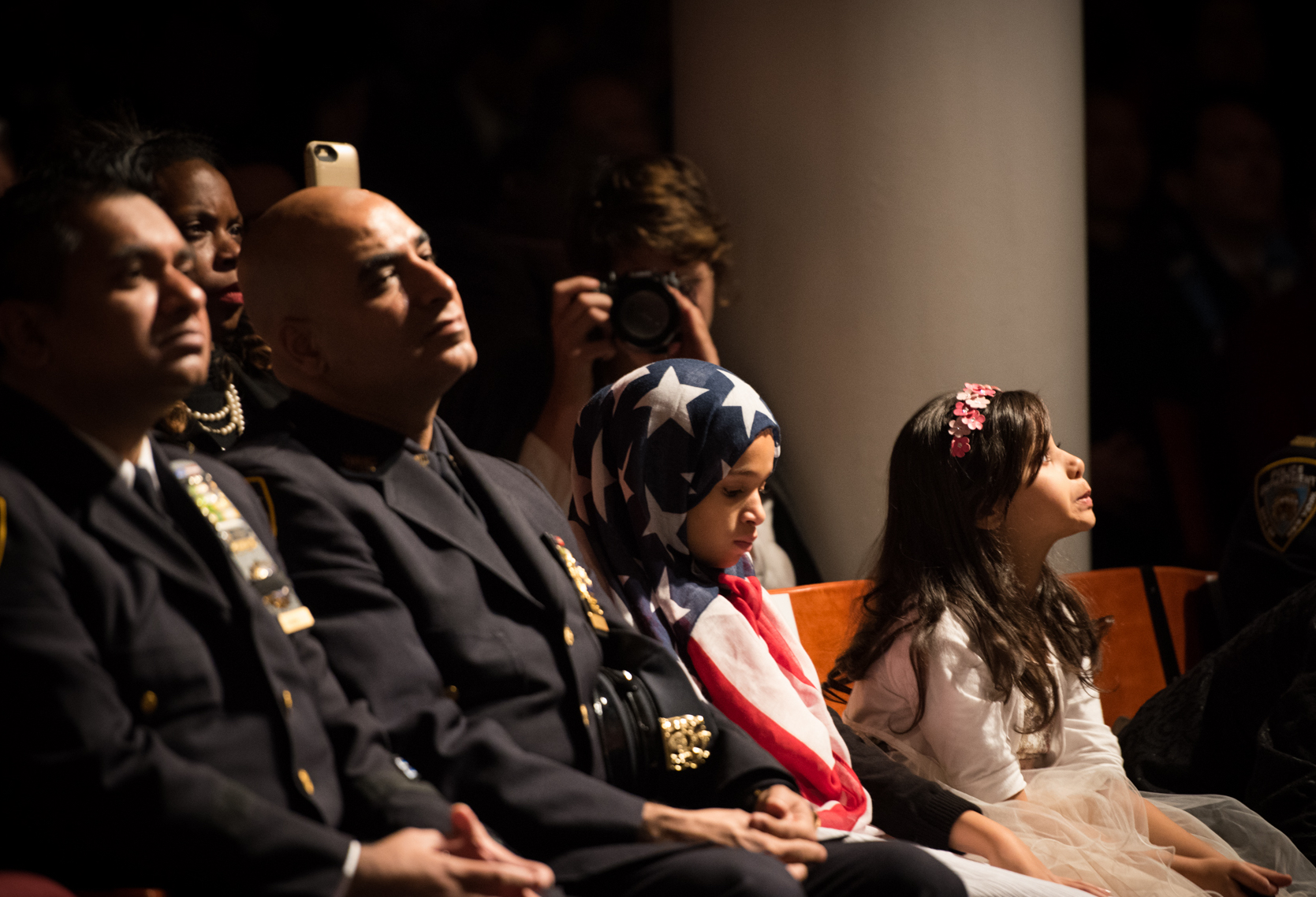
Boeglin said the conviction of an immigrant must have occurred within the last five years, or must have resulted in incarceration that ended within the last five years, “and it must be for one of a defined list of violent or serious felonies or hate crimes enumerated in the laws,” she noted.
Elizabeth Plum, director of special projects at the New York Immigration Coalition, at 131 W. 33rd St., said some of her colleagues once regarded Trump’s fiery bombast as just “hot air,” but then came the reports of hate crimes after his election.
“There have been multiple acts of intimidation and reports of individuals — particularly Muslim women — who have been threatened,” Plum said. “The Southern Poverty Law Center has recorded 200 since Election Day.
“There was a point where we wrote off Donald Trump as hot air. But at this point, who knows what he will do or say? It’s a risk having him hold one of the most powerful positions in the world.
“We can’t make assumptions,” she said.
“We are absolutely planning for the worst and praying for the best.”
